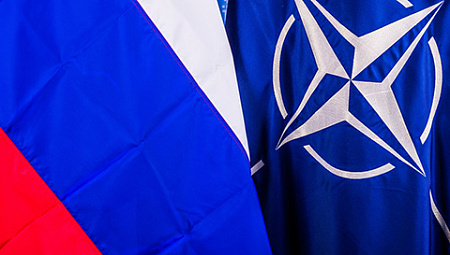Moscow. March 23. INTERFAX - Contacts between Russia and NATO have been interrupted, but in the modern world it is always possible to organize them technically, including to prevent military incidents, said Deputy Foreign Minister Alexander Grushko.
"Now the channels are interrupted. In any case, we live in the 21st century, and if there is a need, you can pick up the phone and call," he told Interfax on Thursday, answering the question whether there is a kind of "hotline" between Russia and NATO, with which it would be possible to prevent incidents similar to when an American drone crashed over the Black Sea.
According to the Deputy Minister, "the issue is not the presence or absence of this hotline, but the problem is that in this case, when the incident occurred on the Black Sea, it was an intentional incident."
"It was a provocation, absolutely provocative behavior. It was a deliberate incident," Grushko stressed.
"You can have, of course, a "hot phone". But if a conscious decision is made to commit a provocation, no "hot phones" will help," the high-ranking diplomat noted.
According to him, the area where the American drone entered "was declared a security zone in accordance with all international rules." "This is an access restriction zone that was declared by the Russian Federation, and a corresponding notification was given to our Ministry of Defense. Here the essence of the issue lies precisely in this," Grushko said.
Therefore, he stressed, "international rules were violated, which, of course, led to the fact that our pilots were forced to react very professionally, without the use of weapons."
Speaking about the existence of the so-called "hotline" between Russia and NATO, Grushko said that the topic of systemic and emergency communications between the military was developed as a result of the adoption in 1986 of the then revolutionary Stockholm document on confidence- and security-building measures, which ensured transparency of significant military activities of NATO countries and the Warsaw Pact Organization. In June 1989, an agreement was signed between the USSR and the USA on the prevention of dangerous military activities, which became another stage in the development of rules for responsible behavior in the air, on land and at sea.
However, even later there were incidents that required solutions to improve such tools, the Deputy Foreign Minister of the Russian Federation noted. One of them occurred in 1989 after a Soviet MiG-23M fighter jet flew thousands of kilometers over the territory of a number of NATO countries without a pilot, who ejected as a result of an engine malfunction and, having run out of fuel, collided with the ground in Belgium a few kilometers from the French border. Then one person died.
In addition, as Grushko said, the discussion on the prevention of incidents between Russia and NATO was conducted in 2012-2013.
"We came out with proposals to agree with them on clear rules of conduct in the air and in the waters, to establish maximum approach distances, for example, between ships and combat aircraft. But, unfortunately, then the NATO countries did not go for it for political reasons," the deputy minister said.
He also cited the example of cooperation between Russia and NATO in connection with the increased military activity of the alliance after its expansion in the waters and airspace of the Baltic Sea. "We have agreed that an internationally recognized route will be created connecting Kaliningrad with St. Petersburg, which will be used by the state and military aviation of the Russian Federation. Transponders were used, which allows civilian controllers to see the planes. This agreement has worked," Grushko recalled.
According to him, the agreement with the pre-transmitted flight plans is still in force, however, "NATO members prefer to intercept our aircraft that fly along the route with transponders turned on." "This in itself is another evidence that if there is no intention to comply with the agreements, then the tools are not functional," Grushko added.
Today, the Deputy Foreign Minister stressed, "there is no technical impossibility to contact, it always exists." "Therefore, if NATO deems it important to give us some information that is significant militarily, then there are plenty of opportunities to do this," he said.

